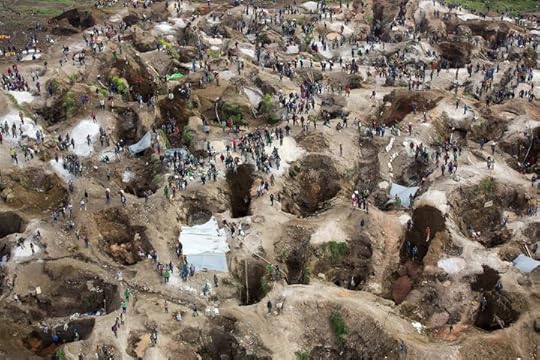Cobalt isn’t a conflict mineral

Luwowo, conflict free certified, Coltan mine near Rubaya, North Kivu March 2014. Image credit Sylvain Liechti via MONUSCO Flickr under CC license.
The Democratic Republic of Congo (DRC)���s ���conflict minerals�����(tin, tantalum, tungsten,��gold)��often appear��in��advocacy campaigns��given their importance for��western consumer electronics, but a different mineral, cobalt, has gained��media��attention��recently.
News��articles have��likened��the DRC���s cobalt to Wakanda���s��vibranium; discussed��a��Canadian alternative��to Congolese cobalt��for electric cars; and��described a��new��deal��between��Swiss company Glencore (the world���s biggest cobalt producer)��and��a Chinese firm.��Another��piece��described moves by several different Chinese corporate investors to buy in to the cobalt boom in the Kolwezi area, while the BBC recently described the situation as a�����new gold rush.�����With rapidly rising demand for��the cobalt needed to manufacture��electric cars, a new ���ethical cobalt��� scheme is being��trialed��in the DRC���s artisanal cobalt mines, with��blockchain��being used as part of these efforts.
Previously, the��US administration��announced��it����suspend��the Dodd-Frank Act���s ���conflict minerals��� provisions��for two years.��Although��Human Rights Watch��and��Amnesty��expressed concern about��suspending this��legislation, an��investigation��found��merit��in Trump���s��assertion that Dodd-Frank��caused Congolese people to lose their livelihoods.��Trump��and the Republicans��have ideological reasons for disliking Dodd-Frank:��the��cost��of compliance,��and their view that the SEC has��overstepped��its role. Yet,��the��issue should not be reduced to ���regulation��� vs. ���no regulation,�����but��seen as an opportunity to design better transnational governance to address��conflict and human rights in mining.
The ���conflict minerals��� narrative��links��the presence of armed groups in eastern DRC to��mineral riches��for which these groups loot, rape��and kill civilians.��National, regional��and international supply-chain initiatives, like Dodd-Frank,��have multiplied,��requiring��companies to disclose the fact��they use these minerals, and��make their supply chains�����conflict free.��� However,��academics��respond that��multiple��factors contribute to conflict. Armed groups��rely��on a��range��of sources of income; for some, minerals play��little or no��role.��Many��mines are not��controlled��by armed groups.��Attempts to regulate supply chains��carry potential negative consequences,��such as a��de facto��boycott of��all��minerals from the DRC,��even��where there is no conflict.
Congolese and international��researchers��have shown that Dodd-Frank has had unintended and negative consequences. Some industry actors��avoided��sourcing from the DRC, which��made artisanal miners, their dependents��and people in related industries��more��vulnerable.��Supply chain initiatives have not had a��meaningful impact��on traceability or conflict, and may even��trigger conflict��and/or��increase��the incidence of fighting, looting��and violence against civilians.
Although��efforts to demilitarize mineral supply chains��are not new,��several human rights groups want ���conflict mineral���-style supply chain traceability and due diligence��extended to��artisanal��cobalt mining. A��report��by Amnesty International and��Afrewatch��in January 2016 highlighted the poorly paid, hazardous conditions in which��children and adults work.��A November 2017��follow-up report��by��Amnesty assessed 29 companies�����responses��on��how they source their cobalt.
There is a need for systematic evaluation of��potential��risks to��ordinary people���s livelihoods��from expanding the ���conflict minerals��� category.��The negative effects reported in��Kivu provinces,��particularly the��loss of employment��for tens of thousands to��millions of miners,��suggest there is cause for concern about similar impacts��in southeastern DRC, already in economic difficulty��due to��low copper prices.��The��de facto��boycott has led to negative consequences for those in eastern DRC who depend on artisanal mining, including��loss of income;��negative effects��on child mortality and healthcare; and an��expansion��in illegal activities and smuggling.��Evidence from the��Kivus��points to the disproportionately negative impacts of supply-chain measures on artisanal miners and women in associated economic activities. In southeastern DRC, these groups are already disadvantaged, as multinational corporations have removed tens of thousands of artisanal miners from their concessions.
Recent events suggest��that a��quasi-boycott is a real possibility.��Companies��responded��to advocacy about cobalt, while the��Washington Post,��Wall Street Journal, and��Compliance Week��picked up the story. The fact that companies like Apple have��signaled��their intention to follow up on the cobalt supply chain shows the attention has had real effects. In March 2017,��Apple��announced��it had put a temporary hold on purchases of hand-mined cobalt from the DRC while it addresses working conditions and child��labor.��A recent BBC article��highlighted��that while corporate investment in the DRC���s cobalt is likely to continue growing, concerns��about��child��labor��and corruption have led investors to seek to develop cobalt mining in other countries.
There are��implications of expanding the ���conflict minerals��� category to include minerals extracted in��exploitative, inhumane conditions. Many artisanal miners across Africa toil in similar conditions. To compare child��labor��with the financing of armed groups obscures the��reality��that economic hardship forces some children to work in mines.��Women���s involvement��in artisanal mining, and the negative effects for them,��has also been cited as a reason to clean up southeastern DRC���s��artisanal mining (ASM)��sector. Yet efforts to limit women���s��participation��could reduce their access to income.��Although��the dangerous and at times exploitative conditions��for��artisanal miners should be addressed, the ���conflict minerals��� framework is only one option. When it comes to managing ASM in��the��contexts of limited government capacity, good practices and education may be��preferable��to licensing and regulation.
To include cobalt and other non-conflict minerals in supply chain initiatives in the DRC��would��make multinational corporations even more powerful��in a region where mining firms already��dominate��the economy, and where their involvement is��increasing��rapidly. Implementing supply-chain measures without addressing the��broader conditions��could further marginalize artisanal miners already under pressure by large-scale mining.
Sean Jacobs's Blog
- Sean Jacobs's profile
- 4 followers



